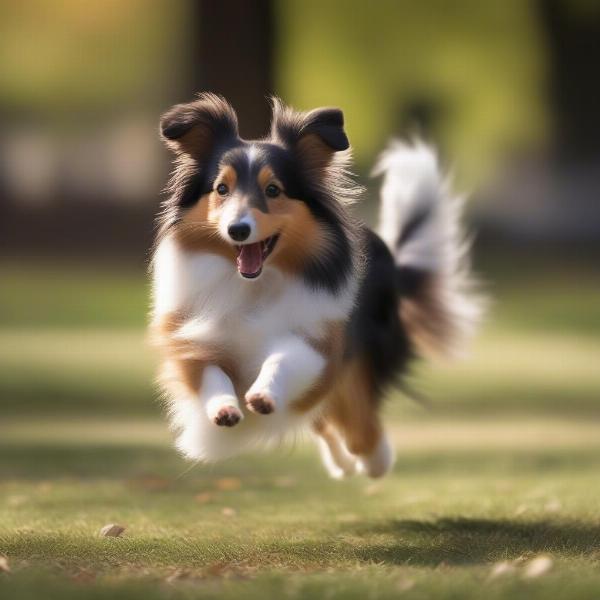Miniature Sheltie dogs, often a topic of much curiosity, capture hearts with their Sheltie-like appearance in a smaller package. While a true “Miniature Sheltie” breed doesn’t exist, the desire for a smaller version of this beloved herding dog has led to various breeding practices. This article explores the different ways a “miniature Sheltie” might come to be, discusses the important health and temperament considerations, and offers practical advice for caring for these intelligent and charming companions.
Understanding the “Miniature Sheltie”
The term “miniature Sheltie dog” can be misleading. There isn’t an officially recognized miniature Sheltie breed. What people often refer to as a miniature Sheltie is usually one of three things: a smaller-than-average Shetland Sheepdog, a Sheltie mixed with a smaller breed, or a Sheltie affected by dwarfism. It’s crucial to understand these distinctions when searching for a “miniature Sheltie.” Each type comes with its own set of considerations regarding health, temperament, and overall care.
Finding a “Miniature Sheltie”
Finding a smaller Sheltie requires careful research and responsible breeding practices. Avoid breeders who specifically advertise “miniature Shelties” as this often indicates unethical breeding practices that prioritize size over health and well-being. Instead, look for reputable Shetland Sheepdog breeders who prioritize the health and temperament of their dogs. They can provide information about the expected size range within their litters and help you find a Sheltie that fits your desired size, within the standard breed range. Be prepared for a longer search and be wary of breeders promising unusually small puppies.
Health and Temperament Considerations
The health of a “miniature Sheltie” depends largely on its origin. Smaller-than-average Shelties within the standard breed range are generally healthy. However, Shelties bred for extreme small size or those resulting from crossbreeding can be prone to health issues inherited from either parent breed. Shelties affected by dwarfism can face various health challenges related to their skeletal structure. Temperament can also vary. While Shelties are known for their intelligence, trainability, and affectionate nature, crossbreeding can introduce unpredictable temperament traits.
Caring for Your “Miniature Sheltie”
Regardless of its origin, a “miniature Sheltie” needs the same basic care as any Shetland Sheepdog. This includes a high-quality diet, regular exercise, grooming to maintain their beautiful double coat, and ongoing training and socialization. Their intelligence makes them eager to learn and participate in activities. Early socialization is crucial for developing a well-adjusted and confident companion.
Training Your Miniature Sheltie
Miniature Shelties, like standard Shelties, are intelligent and eager to please, making them relatively easy to train. Positive reinforcement methods, such as reward-based training, work exceptionally well with this breed.
Exercise Needs
Despite their smaller size, these dogs still require regular exercise to maintain their physical and mental well-being. Daily walks, playtime, and engaging activities are essential.
 Miniature Sheltie Dog Playing Fetch
Miniature Sheltie Dog Playing Fetch
Conclusion
While a true miniature Sheltie breed doesn’t exist, smaller Shetland Sheepdogs and Sheltie mixes offer the charm of this breed in a smaller package. By understanding the different origins of “miniature Shelties” and prioritizing responsible breeding practices, you can find a healthy and loving companion. Providing proper care, training, and socialization will ensure a happy and fulfilling life for your “miniature Sheltie” dog.
FAQ
- Do miniature Shelties shed a lot? Yes, like standard Shelties, they have a double coat and shed moderately throughout the year, with heavier shedding during seasonal changes.
- Are miniature Shelties good with children? Generally, yes. Shelties are known to be good with children, especially when properly socialized from a young age.
- How long do miniature Shelties live? Their lifespan is similar to standard Shelties, typically 12-14 years.
- How much exercise does a miniature Sheltie need? They need at least 30-60 minutes of exercise daily.
- Are miniature Shelties easy to train? Yes, their intelligence and eagerness to please make them highly trainable.
- What health problems are miniature Shelties prone to? Potential health concerns can depend on their origin and include eye problems, hip dysplasia, and von Willebrand’s disease.
- Where can I find a reputable miniature Sheltie breeder? Contact national breed clubs for referrals to responsible Shetland Sheepdog breeders.
Related Articles
About ILM Dog: ILM Dog is your trusted international resource for comprehensive dog care information. We offer expert advice on everything from breed selection and health care to training and nutrition, equipping you with the knowledge and resources you need to provide the best possible care for your canine companion. For personalized guidance or further information, contact us at [email protected] or call +44 20-3965-8624.